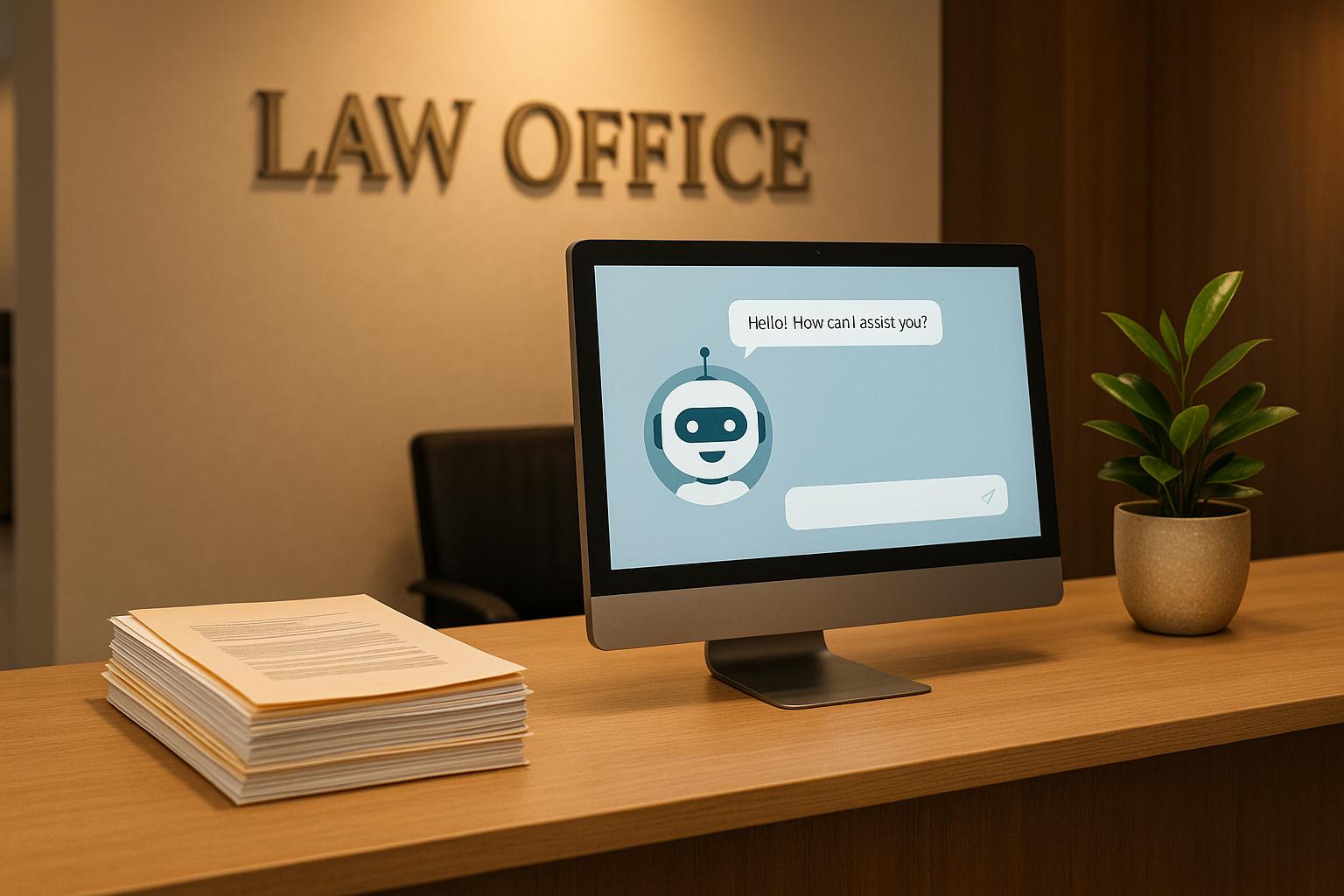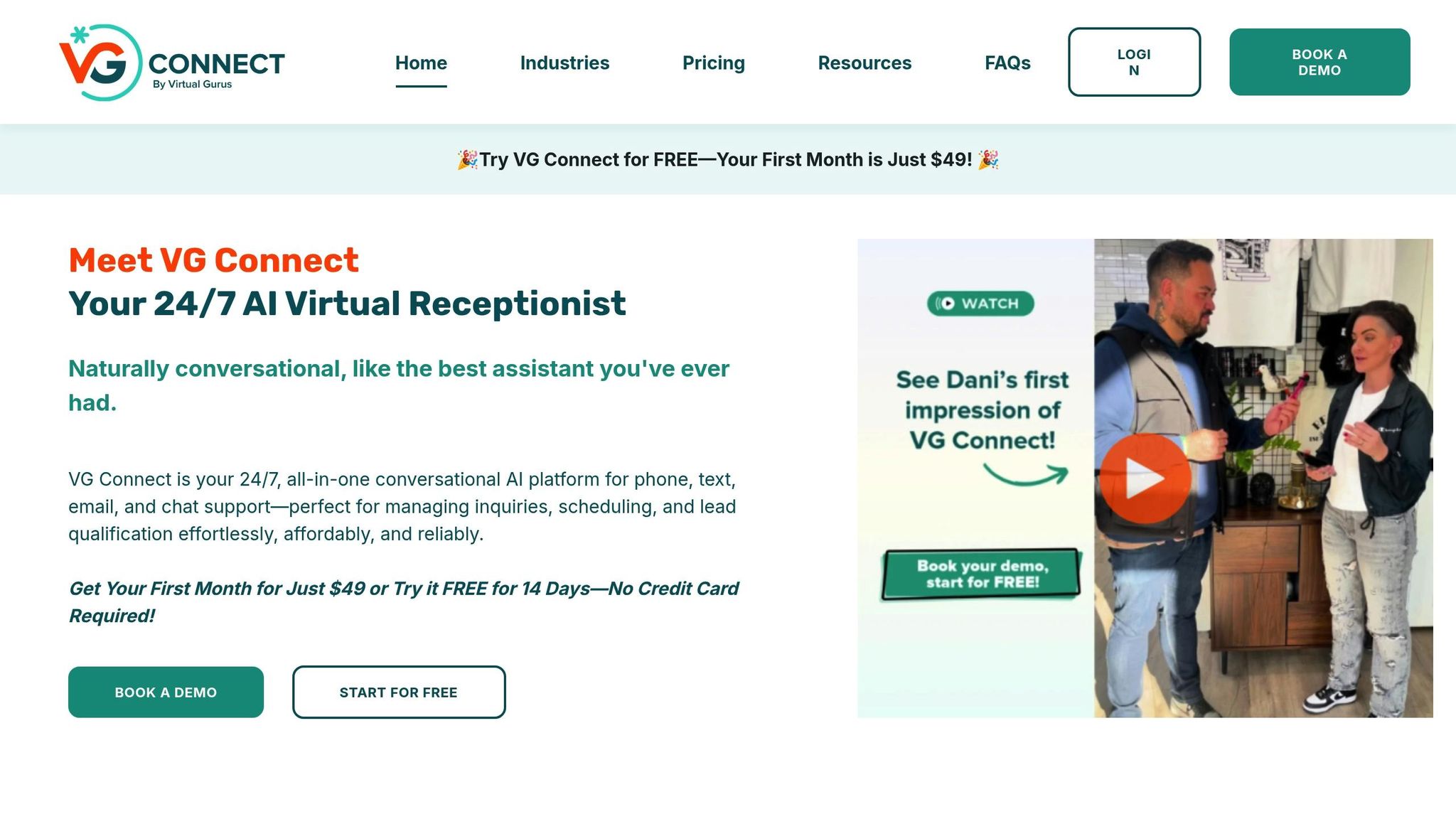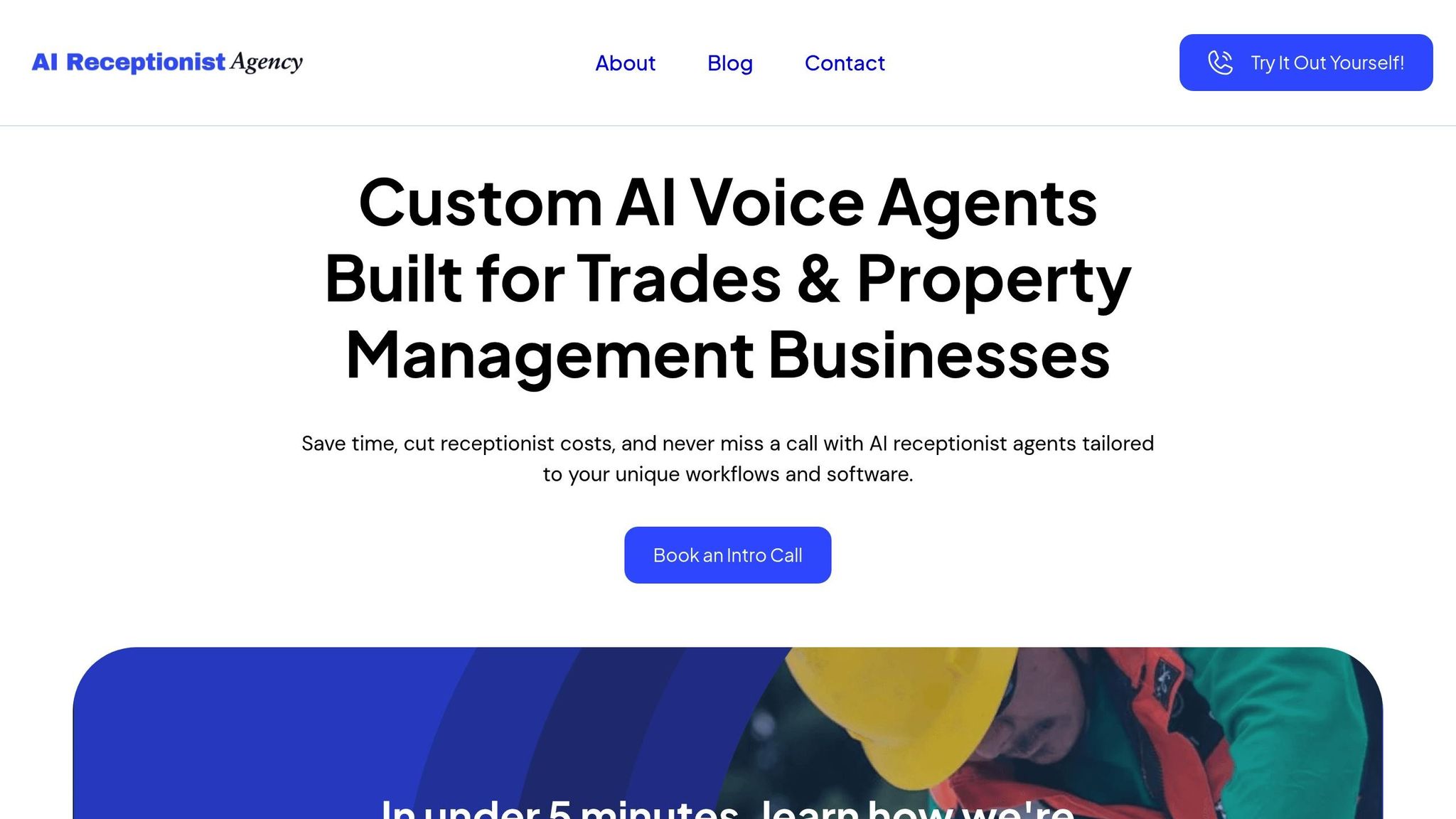
AI receptionists are transforming how law firms manage costs and client interactions. Here's why they're worth considering:
AI receptionists combine affordability with better client service, making them a smart choice for legal firms aiming to reduce overhead while improving operations.

When it comes to cost, AI reception systems offer a clear advantage over traditional receptionists, significantly cutting expenses while maintaining essential services.
The financial commitment for hiring a traditional receptionist goes well beyond just their salary. On average, a front desk employee earns between $30,000 and $45,000 annually. But when you account for additional costs like health insurance, payroll taxes, paid time off, training, and office-related expenses, the total annual cost can soar to $46,000–$77,000.
| Cost Category | Traditional Receptionist | AI Reception System |
|---|---|---|
| Base Salary | $30,000–$45,000 | $0 |
| Health Insurance | $8,000–$15,000 | $0 |
| Payroll Taxes | $3,000–$5,000 | $0 |
| Vacation/Sick Pay | $2,000–$4,000 | $0 |
| Training Costs | $1,000–$3,000 | Minimal setup |
| Office Space/Equipment | $2,000–$5,000 | $0 |
| AI System Cost | $0 | $3,000–$5,000 (annual) |
| Total Annual Cost | $46,000–$77,000 | $3,000–$5,000 |
The difference is staggering. AI reception systems, which can handle tasks like answering calls, scheduling appointments, and managing inquiries, cost only a fraction of what traditional staffing requires. Basic AI plans start as low as $30–$150 per month, with more comprehensive packages averaging $3,000–$5,000 per year. This translates to labor cost reductions of roughly 50–70% compared to traditional receptionists.
For example, a mid-sized law firm that implemented an AI receptionist saved about $30,000 annually while also enhancing client interaction. The AI system managed 75% of inquiries without human assistance, improving both efficiency and service quality.
Traditional receptionists can only manage one call at a time, which creates limitations during peak hours. This bottleneck can result in a 10–15% loss of potential clients. On the other hand, AI systems excel in handling multiple calls simultaneously, ensuring nearly instant responses. This speed advantage minimizes missed opportunities, helping businesses maintain and even grow their revenue.
The reliability of AI systems has driven their popularity in the legal field. A survey found that 79% of lawyers have adopted AI solutions, with 95% reporting noticeable cost savings.
One of the standout benefits of AI reception systems is their ability to provide uninterrupted, 24/7 service. Unlike traditional receptionists, who require overtime pay, vacation coverage, and substitutes during sick days, AI systems operate continuously without additional costs.
This constant availability ensures a high level of service while slashing expenses. Companies that transitioned to AI systems report saving an average of 60% on reception-related costs over five years. For law firms, the switch to virtual receptionists can result in annual savings exceeding $45,000 by eliminating expenses tied to benefits, training, and recruitment.
Legal firms operate in a unique environment, requiring tailored solutions to meet their specific needs. AI reception systems are designed to address these challenges head-on, streamlining operations while maintaining the professionalism that clients expect.
Legal emergencies don’t stick to a 9-to-5 schedule. Clients often need immediate help for urgent, time-sensitive issues, and AI receptionists ensure that no crucial call is missed - day or night.
These systems come equipped with smart routing features that prioritize calls based on urgency and case type. By recognizing keywords, the AI can identify emergencies and connect them to the right attorney while managing or deferring less critical inquiries. This level of responsiveness plays a key role in client retention and acquisition. In fact, research shows that 67% of clients choose a law firm based on its responsiveness, and 82% of consumers expect immediate replies to service inquiries. For distressed clients, this swift response can make all the difference.
But call handling is just the start - AI receptionists also transform the way firms handle client onboarding.
Client intake is vital but often time-consuming. AI receptionists simplify this process by automating scheduling and gathering essential details during the first interaction. Whether it’s collecting contact information, understanding the legal issue, or even assessing case merit, these systems handle it seamlessly.
Take, for example, a personal injury firm that implemented AI reception services. Within the first month, they saw a 400% increase in consultation bookings, largely because prospects could schedule evening consultations instantly.
These systems also integrate with case management, CRM, and billing tools, keeping client data updated without manual intervention. This automation allows lawyers to focus on billable work, a significant benefit considering that studies show attorneys spend roughly half their time on non-billable tasks.
Efficiency is important, but security and compliance are non-negotiable in the legal field. AI reception systems built for legal use prioritize client confidentiality and adhere to strict regulatory standards.
Technical safeguards are at the core of these systems. They include encryption for data in transit and at rest, secure transmission protocols, user identification systems, and audit controls. Multi-factor authentication ensures that only authorized personnel have access.
Additionally, these systems utilize identity verification, data masking, and strict access controls to protect sensitive client information. Legal firms can also rely on Business Associate Agreements (BAAs) with AI providers to clarify responsibilities and ensure compliance.
On the administrative side, AI systems are paired with ongoing training for both the technology and human staff, ensuring efficient operations while maintaining compliance. Escalation protocols allow the AI to hand off complex or sensitive cases to human staff when needed.
AI reception systems also offer bilingual support, breaking down language barriers and ensuring that all clients receive the same quality of service during initial consultations. Regular security audits and system monitoring further protect the integrity of client data.
AI reception systems are reshaping the way legal firms manage costs and attract clients. By reducing expenses and improving client acquisition, these systems deliver a clear return on investment (ROI) that’s hard to ignore.
Let’s talk numbers. Traditional call centers typically cost between $5 and $25 per interaction, but AI systems slash that to just $0.50 to $5 per interaction. On top of that, AI solutions are about 70–80% cheaper than hiring human staff to cover the same hours. These systems come with predictable monthly subscription fees, ranging from $50 to $5,000, making budgeting far easier [34,32].
AI receptionists also handle multiple tasks at once, eliminating the need for extra staffing, which can add up to 20–30% to annual costs. Take, for example, a mid-sized family law firm that cut its administrative staffing costs by 35% after adopting an AI reception system. Not only that, but they also saw a 28% boost in client satisfaction scores. These savings don’t just stay in the books - they directly fuel client acquisition efforts.
AI receptionists aren’t just cost-cutting tools; they’re game-changers for client responsiveness. By improving intake processes, firms have seen client conversion rates jump by 35–45%. One personal injury firm with seven attorneys reported a 43% increase in client acquisition within three months of using AI reception for after-hours coverage.
The benefits don’t stop there. Advanced AI systems lead to 28% higher client satisfaction and 22% more referrals. They also cut contact center expenses by up to 60% while boosting customer satisfaction by 27% [33,34]. These improvements create a ripple effect, enhancing both client relationships and the firm’s bottom line.
The savings generated by AI reception systems open up new opportunities for growth. With reduced costs, legal firms can reinvest in areas like marketing, technology, and hiring top talent. On average, businesses see a $3.50 return for every $1 spent on AI. For legal-specific AI services, which cost between $97.50 and $292.50 per month, firms gain the ability to plan budgets more effectively compared to the fluctuating costs of human staffing.
Consider one small business that saved $31,200 annually on staffing costs while recapturing $25,000 in missed revenue, resulting in an eye-popping ROI of 2,114%. While this example isn’t specific to legal services, it highlights the potential for massive returns when AI systems recover previously lost opportunities. In legal practices, handling after-hours and weekend inquiries can be a game-changer. The Thomson Reuters Institute emphasizes that AI should be seen as a tool to enhance legal service delivery, not just a way to cut costs. Additionally, firms using AI-driven retention strategies have reduced client churn by up to 30%, leading to longer-lasting relationships and higher client lifetime value.

The AI Receptionist Agency provides round-the-clock virtual receptionist services specifically designed for legal professionals. This ensures no client inquiry goes unanswered while adhering to strict compliance standards. With advanced features, proven results, and smooth software integrations, this platform delivers a comprehensive solution for law firms.
Legal professionals require tools that understand the complexities of their work. The AI Receptionist Agency offers a system that is not only HIPAA-compliant but also tailored to safeguard sensitive client information for both legal and medical professionals.
The platform’s intelligent call routing system ensures urgent cases reach the appropriate attorney without delay. Its automated intake process uses customized scripts and multilingual support to streamline onboarding for new clients. For instance, if someone calls with a time-sensitive legal matter, the AI recognizes the urgency and connects them with the right expert immediately. These scripts and workflows are customized to align with each firm’s specific practice areas, ensuring a personalized and efficient experience.
The platform has shown measurable success in real-world applications. Take, for example, a family law practice in Chicago with five attorneys. After implementing the AI solution in 2023, they saw an 87% reduction in missed calls, a 32% increase in consultation bookings within the first quarter, and saved approximately $45,000 annually compared to hiring additional reception staff.
Larger firms have also seen remarkable outcomes. A national law firm with over 200 attorneys across 12 offices integrated the AI receptionist into their case management system. This reduced their call abandonment rate from 23% to under 5% and resolved 68% of routine inquiries without attorney involvement. Their ROI analysis reported a 230% return within the first year.
The AI Receptionist Agency doesn’t just stop at answering calls - it seamlessly integrates with widely-used CRM systems like HubSpot and Salesforce, as well as legal-specific case management tools. When the AI handles a call, it automatically syncs client details with the firm’s existing systems, eliminating the need for manual data entry and ensuring accurate, consistent records.
This integration also enables automated scheduling that syncs directly with attorneys’ calendars, allowing clients to book consultations without needing staff assistance. For legal practices, this means smoother case updates and compliance-ready record-keeping. From the first client interaction to intake, the system creates a unified workflow that ensures all information is properly documented. For firms using specialized legal software, case files are automatically updated with call summaries, client communications, and appointment details. This creates a comprehensive audit trail that supports both client service and compliance.
Consider this: 42% of potential legal clients expect a response within three hours. By combining AI reception capabilities with existing systems, law firms can meet this expectation while maintaining the detailed documentation required for their practice.
AI reception systems offer a smart way for legal firms to save money. Small firms can cut reception costs by 60–80%, medium firms by 70–85%, and large firms by 75–90%. These savings aren't just numbers - they represent funds that can be redirected toward growing your practice.
But the benefits go beyond just saving money. AI receptionists can manage multiple calls at once, respond in as little as 3 seconds, and resolve 94% of routine inquiries without needing escalation. Traditional reception setups just can't keep up, especially during busy periods when human limitations slow things down.
For legal firms, the solution is clear. The AI Receptionist Agency provides a specialized platform designed for the unique needs of legal professionals. With HIPAA-compliant AI, smart call routing, and seamless integration with existing case management tools, it tackles the specific challenges law firms face. By reducing overhead by 60% and increasing lead conversion rates by up to 50%, it transforms reception services from a basic cost into a strategic investment.
This technology doesn't aim to replace human expertise - it’s about giving your team the freedom to focus on what they do best: tackling complex legal work. AI reception systems improve cost efficiency, enhance client satisfaction, and streamline operations. For firms looking to stay competitive while managing expenses, adopting AI reception technology is quickly becoming a must-have for sustainable growth in today’s legal industry.
AI receptionists play a key role in helping legal firms boost client satisfaction and loyalty by being available 24/7. With round-the-clock accessibility, they ensure no calls or inquiries slip through the cracks. This kind of immediate response leaves a strong first impression, fostering trust and making clients feel appreciated and supported.
Beyond just answering calls, AI receptionists simplify client intake processes, handle urgent calls with ease, and deliver personalized interactions through custom scripts tailored specifically for legal services. By creating a smooth and professional communication experience, they not only improve client satisfaction but also encourage repeat business and word-of-mouth referrals.
When introducing AI receptionists into a legal practice, data security and regulatory compliance must take center stage. Legal practices handle sensitive client information, so ensuring adherence to privacy laws like HIPAA is non-negotiable. Additionally, all data must be encrypted and securely stored to prevent breaches.
To stay compliant, legal firms should focus on a few key areas:
By tackling these priorities, legal practices can integrate AI receptionists with confidence, safeguarding client confidentiality and minimizing legal risks.
Legal firms can assess the return on investment (ROI) of AI receptionists by focusing on key areas like cost savings, better client intake processes, and greater efficiency. For instance, AI receptionists can cut overhead costs by as much as $54,000 per year while offering quicker response times and boosting client satisfaction.
To figure out ROI, apply this formula: ROI = (Benefits – Costs) / Costs × 100%. Benefits to consider include lower staffing costs, improved lead conversion rates, and more streamlined workflows. Monitoring these metrics can give firms a clear picture of how AI receptionists impact both their finances and operations.
Stay informed with our latest updates every week.
Our Blogs